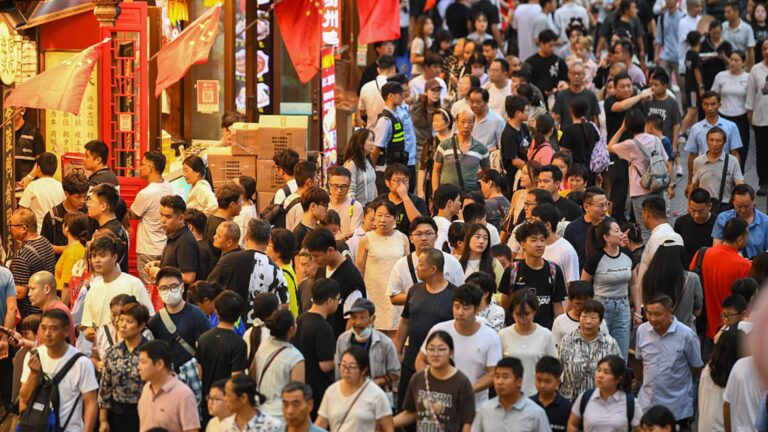Tourists visit the Confucius Temple market area in Nanjing, Jiangsu province, China, on Oct. 1, 2025.
Cfoto | Future Publishing | Getty Images
BEIJING — The latest sign of hyper-competition, or “involution,” has emerged in China’s tourism industry, adding to concerns about growing deflationary pressure in the broader economy.
Over the Oct. 1 to 8 public holiday — dubbed “Golden Week” — total domestic tourism trips reached 888 million and generated 809.01 billion yuan ($113.63 billion) in revenue, according to official data released Thursday. That’s up by 1.8% and 7.6% from last year, respectively, according to CNBC’s calculations of the figures.
The gains, however, slowed from the May 1–5 holiday earlier this year, when domestic trips and tourism revenue grew 6.4% and 8% respectively. In fact, average spending per domestic tourist trip during the Golden Week was also around 3% lower than in 2019 before the pandemic, Goldman Sachs pointed out Thursday.
“The Golden Week was ‘Golden Weak,'” said Mix Shi, founder of PoshPacker Hostels Chengdu Group.
Although his three hostels in the city ended up being fully booked, Shi said he had to cut nightly rates by about 60% — because nearby hotels dropped prices even more.
“Way too much money has been pouring into the hotel industry lately,” Shi said, noting, “the competition is insane, and some really nice places are going for dirt cheap. It’s great for travelers because they have more choices, but it’s a real blow to hostels.”
Chengdu, the capital of Sichuan province in southwestern China, ranked second to Nanjing, capital of Jiangsu province in the east, in tourism spending for the holiday on the Meituan online booking platform.

Among local and international visitors to hostels in mainland China, Chengdu’s popularity more than doubled from last year’s Golden Week, second only to Shanghai, according to HostelWorld. Still, average bed prices fell more than 20% in both cities — to 165.70 yuan ($23.27) in Shanghai and 80.99 yuan in Chengdu.
While most locals have only a handful of paid days off each year, China has sought to encourage businesses to give workers more vacation days and extended official public holidays to boost consumption.
This year’s Golden Week was one day longer than usual because it coincided with the Mid-Autumn Festival, which follows the agrarian calendar. The festival fell on Oct. 6 this year, versus Sept. 17 last year.
“The Mid-Autumn Festival is considered to be a family reunion festival,” said AJ Wang, owner of the X Hotel and Observatory Hill House venues in the northeastern coastal city of Qingdao.
“The real Golden Week, in terms of revenue generation, actually ends on the 6th,” he said, noting he had to cut prices after that date by 60% due to falling demand.
Official domestic tourism revenue for the Golden Week alone rose by 15.4% from 2024, but when including last year’s Mid-Autumn Festival revenue figures, the comparable revenue growth slowed to 7.6%, CNBC calculations…
Read More: China’s Golden Week’ travel boom masks a bruising price war



